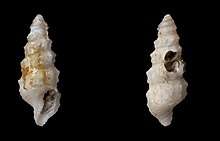Ceritoturris pupiformis
Ceritoturris pupiformis is a species of sea snail, a marine gastropod mollusk in the family Horaiclavidae.[1]
| Ceritoturris pupiformis | |
|---|---|
 | |
| Shell of Ceritoturris pupiformis (specimen at Natural History Museum, London) | |
| Scientific classification | |
| Kingdom: | Animalia |
| Phylum: | Mollusca |
| Class: | Gastropoda |
| Clade: | Caenogastropoda |
| Clade: | Hypsogastropoda |
| Clade: | Neogastropoda |
| Superfamily: | Conoidea |
| Family: | Horaiclavidae |
| Genus: | Ceritoturris |
| Species: | C. pupiformis |
| Binomial name | |
| Ceritoturris pupiformis (E. A. Smith, 1884) | |
| Synonyms[1] | |
| |
Description
The length of shell attains 4⅓ mm, its diameter 1⅓ mm.
The shell is oblong, narrow and almost pupiform. Its color is white and slightly red at the apex. It contains 8 whorls of which two in the protoconch. The whorls increase but slowly and the last three are of nearly the same width. They are divided at the suture by a fine keel, and a double series of largish and rather acute tubercles surround the middle. The small aperture measures about ⅓ the total length of the shell. The outer lip is thin. The siphonal canal is very short and narrow.[2]
Distribution
This marine species occurs in the Gulf of Oman and in the Persian Gulf .
gollark: This was tested by some people, many don't. Fortunately, I don't think you can make a virus just from RNA.
gollark: https://nickbostrom.com/papers/vulnerable.pdf↑ FEAR it
gollark: A competent garbage collector would have deleted the spec already.
gollark: This is why we still have Macron.
gollark: The main language might inherit lack of TCness from C, but templates don't have that restriction.
References
- Bouchet, P. (2015). Ceritoturris pupiformis. In: MolluscaBase (2015). Accessed through: World Register of Marine Species at http://www.marinespecies.org/aphia.php?p=taxdetails&id=719113 on 2017-01-16
- Smith, E. A. (1884). Diagnoses of new species of Pleurotomidae in the British Museum. Annals and Magazine of Natural History (5) 14: 317–329
External links
This article is issued from Wikipedia. The text is licensed under Creative Commons - Attribution - Sharealike. Additional terms may apply for the media files.